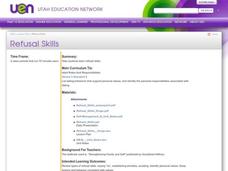Curated OER
Information And Advice On Drugs
Students identify and analyze a variety of sources for information and statistics on drugs. They map out why its important to know the facts about drugs. In addition, they show examples of what happens when you use drugs of any kind.
Curated OER
Anti-drug Shock Tactics
Students evaluate the effectiveness of 'shock tactics' to discourage drug abuse. They view a video about the death of a 21-year-old heroin addict. In small groups they discuss the video and complete comment sheet.
Curated OER
Under the Influence
Students examine the effects of teen drinking. In this personal health instructional activity, students research alcohol's effect on the teen brain. Students discuss their findings about the alcohol-brain connection and create brain maps.
Curated OER
Message in a Bottle
Learners consider the implications of the misuse of alcohol. In this personal health instructional activity, students visit selected websites to discover information about the misuse of alcohol and examine advertisements for alcohol.
Curated OER
Boating Safety
Students are introduced to the safety procedures to follow while boating. After taking a quiz, they complete open-ended questions about boating accidents in Illinois. They discuss as a class how those accidents could have been prevented.
Curated OER
Real Attractive
Sixth graders create a collage of attractive people. They write about what makes these people attractive. They discuss what makes someone attractive. They research eating disorders and how the media impacts what people deem as attractive.
Curated OER
Refusal Skills
Learners analyze the relationship between values and refusal skills. They review types of refusal skills: saying 'no', establishing priorities, avoiding and identify personal values. They determine to keep actions and behavior...









